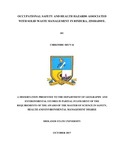Please use this identifier to cite or link to this item:
https://cris.library.msu.ac.zw//handle/11408/2993| Title: | Occupational safety and health hazards associated with solid waste management in Bindura, Zimbabwe. | Authors: | Chikombe, Shuvai | Keywords: | Solid waste management Public health |
Issue Date: | 2017 | Publisher: | Midlands State University | Abstract: | Solid waste management contributes tremendously in upholding public health by reducing the risk of diseases and environmental pollution. Despite the significance of this job, solid waste workers are exposed to a myriad of work related hazards. The objectives of the study were to identify the types of waste which are hazardous to solid waste workers, followed by examining the nature of hazards and to finally assess the effectiveness of the measures in place to combat the occupational safety and health hazards associated with solid waste management practices at Bindura Municipality and then ultimately come up with the appropriate recommendations. The study used qualitative and quantitative research design with study participants being sampled using the purposive sampling methods. Data was collected using questionnaires, observations, and interviews as the data collection tools. The data was then analysed using the Statistical Package for Social Sciences (SPSS). The waste collection methods at Bindura Municipality were undertaken through labour intensive systems which involved carrying heavy loads containing rotting organic wastes, contaminated with pathogens and hazardous wastes. The occupational safety and health hazards associated with solid waste management were dominated by physical hazards (65.91%), ergonomic (22.73%), biological and chemical (6.82%) and psychosocial hazards (4.55%) with potential to cause injuries and illnesses. These hazards were present from the waste collection point to the ultimate point of disposal. The solid waste management practices were dominated by strenuous tasks which contributed to the development of musculoskeletal disorders. Lack of training on safe handling of waste was identified as a risk factor, as was established by a Chi square test of association between training on waste handling and injuries and accidents encountered (p=0.00<0.005). The major safety intervention was the provision of PPE which is actually the last line of defense. The Municipality of Bindura did not have a documented Occupational Safety and Health (OSH) policy or program. To address these OSH issues, they should adopt an OSH Policy and decentralise OSH issues from the Human Resource Department, thereby creating an independent Safety and Health department. Training of workers is also recommended for them to be competent in identifying hazards, use of personal protective equipment and to enable them to uphold the best safety and health practises. | URI: | http://hdl.handle.net/11408/2993 |
| Appears in Collections: | Master Of Science In Safety Health And Environmental Management Degree |
Files in This Item:
| File | Description | Size | Format | |
|---|---|---|---|---|
| FINAL DISSERTATION SHUVAI C.pdf | Full Text | 1.31 MB | Adobe PDF |  View/Open |
Page view(s)
274
checked on Feb 26, 2025
Download(s)
772
checked on Feb 26, 2025
Google ScholarTM
Check
Items in MSUIR are protected by copyright, with all rights reserved, unless otherwise indicated.


